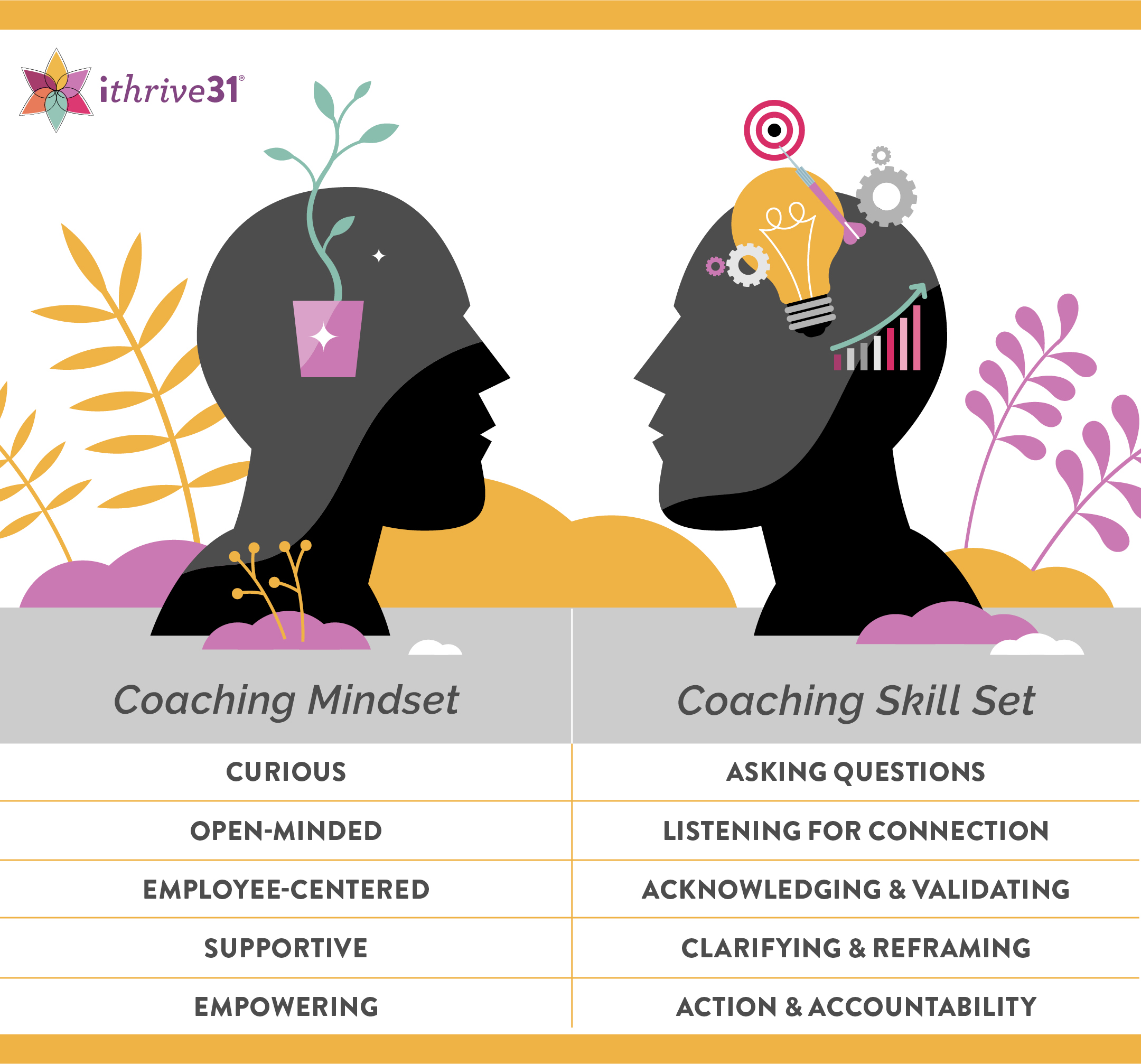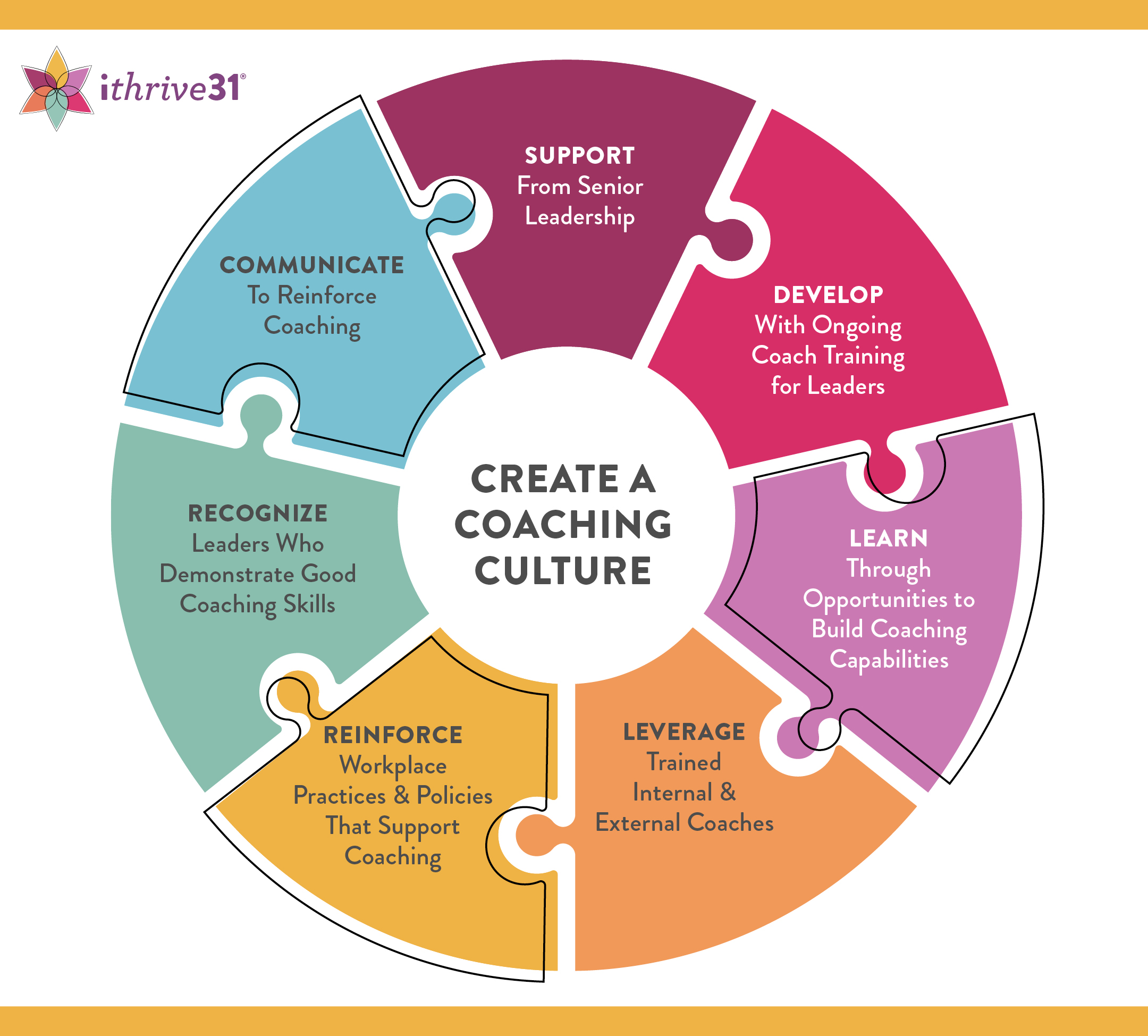
Build a Coaching Culture for Employee Well-Being, Engagement & Results
With so many of our beliefs and assumptions being challenged over the past two years, the role of coaching in organizations should also be challenged.
Traditionally, organizations have invested in coaching practices to support performance and development. But building a coaching culture is the fabric of a healthy, strong, and thriving organization. This goes well beyond managing performance and supporting development. Coaching is at the heart of engagement, overall well-being, and bottom-line results.
What Is Coaching?
Fundamentally, coaching is a way of interacting. It is a way of communicating. It is how we relate to one another. International Coaching Federation defines coaching as “partnering with another in a thought-provoking and creative process to inspire others to reach their personal and professional potential.”
Fundamental mindset and skill sets go along with this definition (see figure 1). When we see a workplace filled with people asking questions, listening for connection, and seeking to understand one another better, we see a workplace of forward progress. This is a work environment where ideas are abundant, respect is the norm, trust is the foundation, and success is experienced by bottom-line impact and committed team members.
Figure 1

Creating a Coaching Culture
We know leaders set the tone of an organization. Creating a coaching culture starts here. This is not a one-and-done leader-as-coach training session. It is not a check-the-box mentality. This is an ongoing commitment to a philosophy, set of behaviors, and practical applications to embed coaching practices as the way we do things around here. It is a systemic way to embed coaching into how an organization operates (see figure 2).
Figure 2

Where to Start
Language matters. Putting thought into how coaching fits uniquely into your business vision and strategy is important. A senior leadership discussion is a good starting point. Promote a coaching culture by starting at the top.
From there, ongoing communication, training, and support align leaders to the expectations and skills needed to step into being great coaches for their teams. Building expertise into the organization is important too. This can be done by training internal resources, such as human resource coaches, and/or leveraging external certified coaches as resources to reinforce the organization’s commitment and build capability.
External Coaching—It’s Not Just for Executives Anymore!
Traditionally, investing in external coaching was designated exclusively for executives and high-potential team members. As we acknowledge the value of coaching beyond the development of a select few, offering coaching to all leaders sends a powerful message.
Leaders are often stuck in the middle without much support. Providing the opportunity to have a confidential leadership coach sends the message “We care about you.” Being an empathetic organization that cares about employees is a big deal. According to a recent Business Solver survey, 83 percent of respondents said they would consider leaving their organization for a similar role at a more empathetic organization.
The pushback on providing this level of support can be the financial cost. However, for companies that understand the power of coaching for employee engagement and well-being, the investment dollars yield multiple returns, including loyalty, commitment, and results. Additionally, many coaching companies find creative ways to offer services at a reasonable cost. They recognize the importance of this support within organizations.
Practices That Support Coaching
One-on-one professional coaching is about growth. The journey to build a strong coaching culture is no different. Customizing an approach to what makes sense for each organization is important. Practical ideas to embed learning include
- building coaching into existing leadership development programs,
- sharing testimonials from leaders, and
- setting up coaching cohorts to learn from each other.
Policies and practices should be reviewed to align with the language and consistent approach for coaching.
As companies see the positive impact of coaching in their workplaces, they can feel satisfaction. They are strengthening their businesses and investing in the development and well-being of team members.
Leveraging the pillars of overall well-being, accountability, and results, ithrive31® partners with organizations to help embed strong coaching cultures. ithrive31’s services include one-on-one coaching, group coaching, personal development workshops, and custom-designed coaching solutions. For more information about coaching for your organization, contact Dorene MacVey at 319-431-1652 or damacvey@ithrive31.com.

